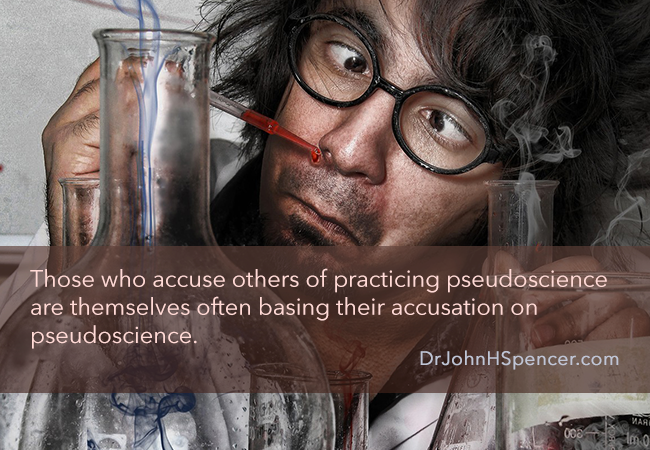A pseudoscientific claim purports to be scientific, even though it is not based on the scientific method or scientific truth. The problem is that there is no such thing as the scientific method, and the notion of “scientific truth” is highly problematic. In fact, what counts as “science”, “truth”, or “evidence” is a philosophical question, not a scientific one. If you claim to have a medical degree, but in reality you do not, then you are a fraud, not a pseudoscientist. Those who accuse others of pseudoscience tend to reduce science to nothing more than empirical data, which consequently would eliminate theoretical physics, pure mathematics, and evolutionary theory. The accusation of being a pseudoscientist is often based on either pseudoscience or no science at all.
Many people, including scientists, have a false, parochial, or distorted view of science. When we haphazardly throw words around without really knowing what we are talking about, we perpetuate a conceptual mess with very damaging effects.
We must first admit that we do not really know what is meant by the word “science”. Richard Dawkins, however, is a good example of a scientist who professes to know the very nature of science when, in reality, he has been duping a great many people. Of course, Dawkins has much of importance to say, but his attacks on religion seem to have blinded him to deeper aspects of scientific discovery. We can at least be certain that science is not limited to direct human observation.
Do you feel or see the earth moving? Do sticks really bend as much as they appear to when submerged in water? Our senses deceive us in many ways, which necessarily means that strict empiricism, the view that all knowledge is obtained through our senses, is necessarily false. Obviously we do need to rely upon our senses, but we also need to rely upon our faculties of reason and intuition, which can reach beyond our sense experience, as much of pioneering theoretical physics often does. Indeed, if it were literally true that science was based solely on empirical data, this would be a disaster for science, since its foundations would be based upon the fallibility and limitations of human sensations, rendering all of science purely subjective.
Moreover, if it is true that only scientific experimentation can lead us to true knowledge, as many pseudoscience accusers would naively assume, then we need to face a dilemma, albeit an escapable one:
- Only scientific experimentation can lead to true knowledge;
- (1) is either true or not true;
- If (1) is not true, then scientific experimentation is not the only route to true knowledge;
- If (1) is true, then (1) itself must also be the result of scientific experimentation;
- There is no scientific experiment that could prove that only scientific experimentation leads to true knowledge, which means that (1) is false;
- Therefore, if (1) is false, then it is false, and if (1) is assumed to be true, then it turns out to be false;
- Therefore, the claim that only scientific experimentation can lead to true knowledge is false.
The pseudoscience accusation assumes that there is something we can truthfully refer to as the scientific method, and further that only this scientific method leads to true knowledge. However, there is no such thing as one inviolable scientific method, and there are ways to true knowledge beyond (or other than) scientific experimentation. So, while it is not difficult to find people using scientific-sounding jargon to conceal their ignorance, peddle falsehoods, or just to sell their products, the fact still remains that those who accuse others of practicing pseudoscience are themselves often basing their accusation on pseudoscience.

The phrase “scientific experimentation” is vague. Unless you believe in some kind of ‘the scientific method’. Unfortunately there is no ‘the scientific method’.
You are correct that the notion of “scientific experimentation” is vague, and also that there is no such thing as “the” scientific method. Moreover, as I argue briefly in the Extended Reading Section above, even if we assumed that there were such a thing as “the” scientific method, and that only scientific experimentation could lead to true knowledge, it would still end up being false that only scientific experimentation could lead to true knowledge.
In other words, if you can assume that an opposing view is correct and still show that this opposing view, by its own assumptions, ends up being incorrect, then you are likely offering a powerful argument.
However, even though there is no absolutely inviolable scientific methodology to be employed across all scientific disciplines and in all aspects of scientific process (while also noting the vagueness of the term “scientific process”), it is still the case that the sciences have been able to provide us with prodigious amounts of new knowledge. Our scientific knowledge, however, is not the limit of reality, and the scientific process is not the only way to know about all of reality. Indeed, part of the scientific process, whatever it actually is, necessarily includes philosophy (metaphysics), creativity, imagination, devoted passion, and sometimes even mystical vision. All of science presupposes that reality is such that we are able to understand some (small) portion of it, and many scientists unconsciously or uncritically hold this view without any scientific or philosophical justification. It is held as an article of faith, but a faith that has proven to be extraordinarily successful, a point which is also made by Einstein.
You can read about these and related topics in greater depth in “The Eternal Law” (https://drjohnhspencer.com/). You may also be interested in reading a relevant short essay I have posted online as a PDF on my Publications Page (https://drjohnhspencer.com/publications.php#scientific-world-view)